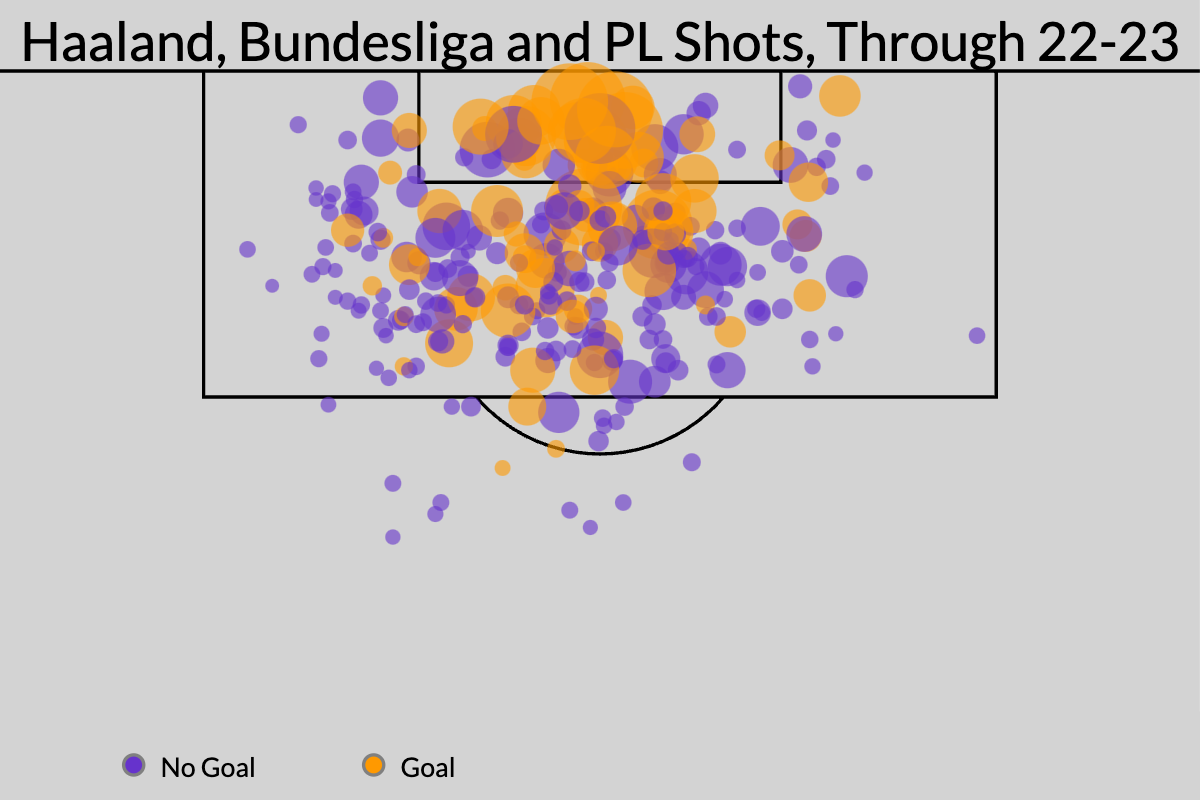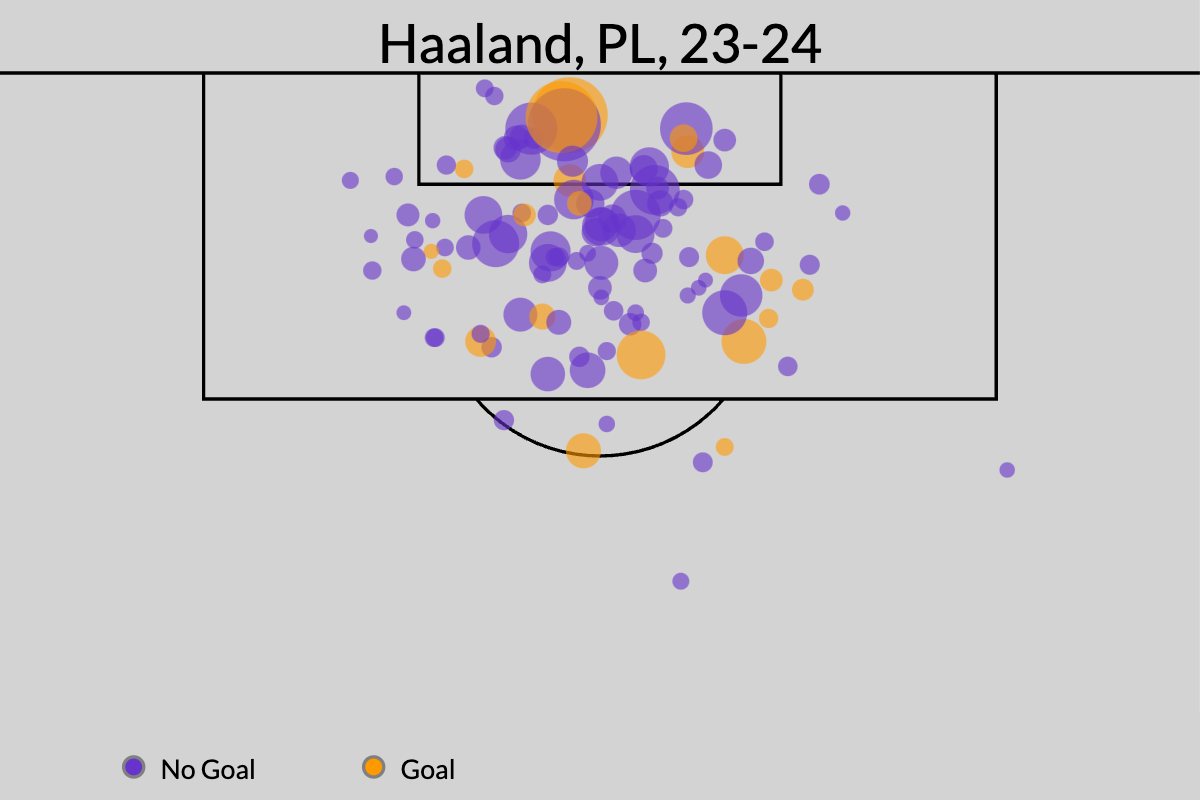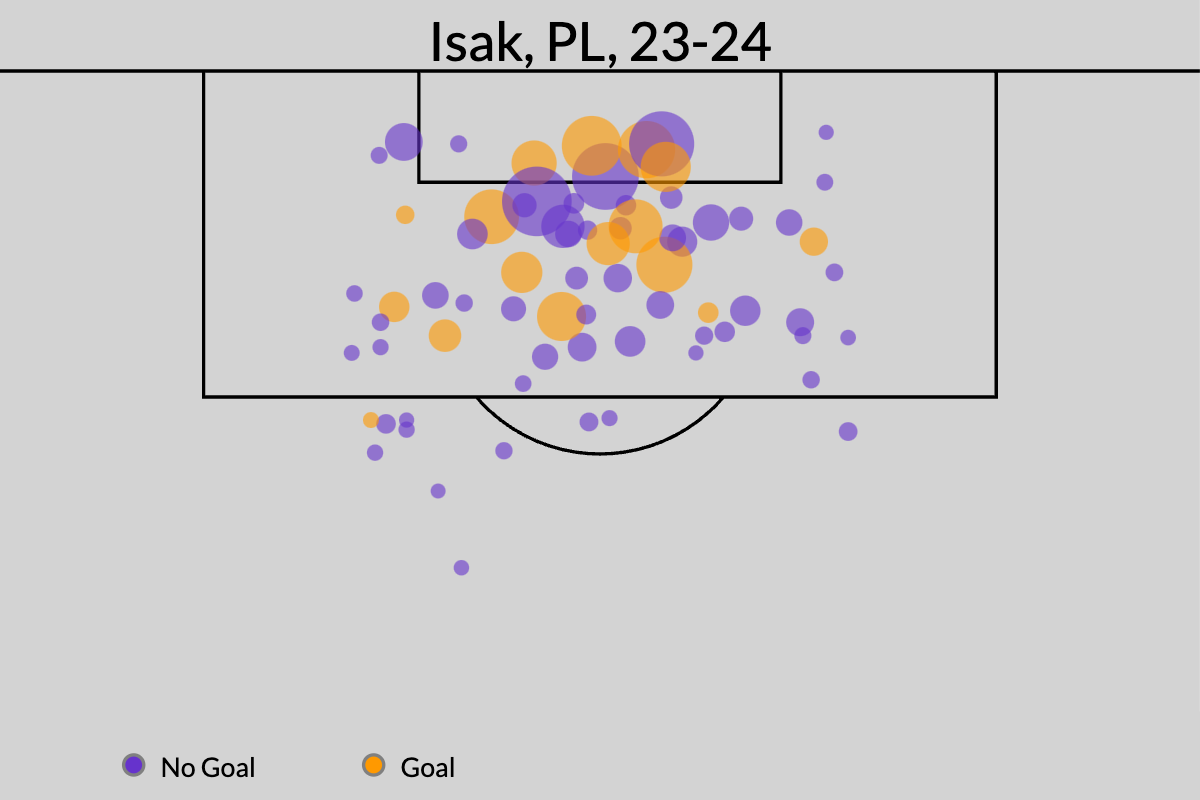It has happened only twice before.
Blackburn and then Newcastle's Alan Shearer led the Premier League in goals for the three straight seasons from 1994-1997. Nearly 10 years later, Thierry Henry did the same for Arsenal from 2003-2006.
Since Henry, a handful of players have done it two years in a row. Robin van Persie (for Arsenal and Manchester United, 2011-2013), Harry Kane (Tottenham, 2015-2017), and Mohamed Salah (Liverpool, 2017-2019) led the league in consecutive seasons but couldn't get there a third time.
And then there's Manchester City's Erling Haaland. In 2022-23, his first season in the Premier League, he broke the goals record with 36. Last year, he let everyone down, scoring only 27 times and easily winning the Golden Boot again. Haaland has been in the league for only two seasons, and Shearer, Henry, Kane, and Salah are now the only players in league history with more career Golden Boots than the 24-year-old Norway international.
It turns out that when you put the best pure goal scorer in the world on top of Pep Guardiola's possession machine at Manchester City, the results are pretty impressive. So impressive, in fact, that it seems inevitable Haaland will do the thing only the two best strikers in Premier League history have done and win the Golden Boot a third straight time.
Per ESPN BET, Haaland's odds of leading the league in goals come out to minus-150 (implied probability of 60%), while no one else is higher than plus-1000 (9.1%).
While those odds suggest that Haaland is by far the likeliest player to lead the league in goals this season, they also suggest there's a decent chance that someone not named Erling Haaland wins the Golden Boot. Who might that be? And what would have to happen for that to occur?
Why Haaland is such a huge favorite for Golden Boot again
There's one massive difference between Haaland, Shearer and Henry. It mirrors a much larger trend across the sport.
To kick off his three-year run of Golden Boots, Henry put 101 shots on target in the 2003-04 season. That's the highest total in Premier League history, according to FBref, and seven more than the next-highest total from former Liverpool striker Luis Suárez, the only other player to register 90 or more shots on target in a single Premier League season, in 2013-14. Henry owns four of the eight highest shot-on-target seasons in league history, and across the three consecutive Golden Boots he averaged 82.3.
Shearer wasn't too different, as his three Golden Boot seasons were the fifth-, 11th-, and 13th-highest shots-on-target campaigns in Premier League history. He averaged 77.3 shots on target across his three leading-scorer seasons.
Seems pretty simple, right? The more shots you put within the frame of the goal, the more goals you're likely to score. Not quite.
When Haaland broke the goal-scoring record with 36, he put just 53 of his shots on target. Across the history of the league, there have been 59 times when a player has registered more shots on target in a season. In 2011-12, Clint Dempsey put more shots on target for Fulham. He scored 17 times.
You might want to attribute it to finishing skill. You've seen Haaland wallop a ball. There are times where he makes such vicious contract that as long as the ball fits within the post and the crossbar, it will become a goal. At our current stage of evolution, the human body is often incapable of materially impeding the shots that Haaland attempts.
That's certainly part of it -- sometimes. In 2022-23, Haaland had six more goals than Expected Goals (xG), the measure of how often a specific shot should result in a goal. And in his three previous seasons with Borussia Dortmund, he exceeded his xG total by 11.
The bigger the circles, the higher the xG value of the attempt:

But last season, Haaland trailed his xG by nearly three goals.
And yet, he still scored five more goals than anybody else:

As you can see from these shot maps, the guy almost never shoots from outside the box and rarely attempts shots from beyond the width of the goal frame. Back in Shearer or Henry's day, those players were frequently attempting low-probability shots from outside the penalty area. While the attempts ended up on frame, they weren't likely to turn into goals.
Pushed forward perhaps by Guardiola more than any other manager, one of the biggest stylistic shifts in the sport over the past 10 years is in the types of shots that teams take. On the whole, teams are attempting fewer shots but coming closer to the goal frame. Man City were already the best team in the world at creating high-quality shots closer to the goal line, and then they added Haaland, the best player in the world at finding space up close.
And so, you have a situation where, as measured by goals to xG, more than 100 players finished their chances more efficiently than Haaland last year, but he still easily led the league in goals. He just gets on the end of so many more high-quality chances than anyone else in the league. Thanks to Man City's ability with the ball and his ability without it, Haaland's goal-scoring baseline is higher than the ceiling for most other players.
OK, but who in the Premier League could beat Haaland?
The betting markets put Haaland's over number at right around 27, or exactly where he scored last season. That seems right. And if anything, it seems a little low.
Why? To start, he just turned 24, which is typically the beginning of a player's peak years at the forward position. In other words: he might still be getting better. On top of that, he generated 29.42 xG last season -- the highest Premier League total since 2009-10, which is as far back as the Stats Perform database goes.
Given how Haaland has finished chances in the past, he could easily have scored more goals last season than he did in the record-breaking year before. He also racked up that massive xG tally while playing only 75% of the league minutes last season. And, oh yeah: while everyone else spent this past summer wearing themselves out playing in dire heat for their national teams, Haaland was, according to him, "in the mountains chopping wood" because Norway didn't qualify for Euro 2024.
Now, the first and most likely way that Haaland does not win the Golden Boot: injury. This is no fun, so we're not going to spend too much time here, but if those 60% odds seem low, this is the biggest reason. Each game missed means fewer attempts on goal, and players get hurt all the time, especially when they play for a team like Manchester City, which should play around 60 games in all competitions. That has to be priced into the projection.
What if he doesn't get injured, though? If we look at the last 20 Golden Boot winners (including ties), here's an average of some top-line statistics:
• Goals: 25.4
• Penalty goals: 3.1
• Age: 26.75
• Team finish: 2.7
Per the betting markets, the biggest favorite after Haaland is Salah. He has, of course, already done it three times. He plays for Liverpool, the team that just nearly set the record for shot attempts in a Premier League season. He's the lead penalty taker. He also had the summer off as Egypt weren't involved in any tournaments. And he was second in the league in xG last season, with 21.2.
The problem, of course, is his age. Salah turned 32 over the summer. The only 32-year-old Golden Boot winner over this period was Jamie Vardy for Leicester in 2019-20, but that was during the weird, COVID-19 pandemic-interrupted season, and he scored only 23 goals. Plus, Vardy's job was to do nothing but score goals, while Salah has taken on an increasingly bigger creative burden as he has aged. Salah would be my pick to win the non-Haaland Golden Boot, but it's hard to see him going supernova at this point.
The closest analog would be Salah matching Didier Drogba's out-of-nowhere 29-goal season at age 31. Otherwise, no one else who was 30 at the beginning of the season has won the award since 2008.
Salah's club teammate Darwin Núñez probably has the highest goal-scoring ceiling of any non-Haaland player because of how many shots he attempts per 90 minutes -- a league best 4.7 -- but even if the Uruguay international is not suspended for fighting fans at the Copa America and becomes a first-choice player under new Liverpool manager Arne Slot, it's hard to see him becoming the club's first-choice penalty taker. That caps his potential as a Golden Boot winner.
Cole Palmer of Chelsea and Bukayo Saka of Arsenal both take just about every important penalty for their teams. They both play for clubs that will either be challenging for the title or a Champions League place. They're both at ages when we should expect them to continue to improve.
But both Cole and Saka also had less than half of Haaland's non-penalty xG last season (Palmer 11.1; Saka 10.8) despite both playing more minutes. Even with their penalty boosts, neither one has been anything close to the open-play shot-getter that they'd need to be to theoretically surpass Haaland.
Palmer's Chelsea teammate Nicolas Jackson was second behind only Haaland in non-penalty xG (18.6), and he's a good bet to score a lot more goals this season than last. But unless he somehow takes over the penalty duties from Palmer, he's unlikely to keep pace with the Norwegian. Jackson didn't attempt a single penalty last year -- despite his best efforts.
The same penalty discount goes to Aston Villa's Ollie Watkins, who was fourth in non-penalty xG last year (16.8) but didn't attempt a single spot kick.
Third in non-penalty xG was Bournemouth's Dominic Solanke (17.2). He's also almost exactly the average age of all the past winners: 26, but turning 27 in September. He took only three penalties last season, and Bournemouth aren't likely to be a good enough team to produce a Golden Boot winner. But if he ends up moving to, as some reports suggest, Tottenham this summer, he could easily be even more productive next season. If he finds a way to Spurs and takes penalties for them, then I could at least envision a world where he gets on the end of better chances and gets hot and pushes into the high 20s.
Instead, though, I think the most likely guy to beat a healthy Haaland is Newcastle's Alexander Isak. I don't think it'll happen, but the 24-year-old Sweden forward at least has the profile of the kind of player who could make the leap to superstardom. To start, he has a very similar shot map to Haaland's:

Isak is in his early prime years, which is usually when a big leap happens. Plus, he's the sort of prospect -- tall, quick, not always clearly in control of his limbs -- who could suddenly put it all together and explode. He has significantly improved in his first two Premier League seasons -- 0.62 non-penalty xG per 90 minutes last campaign, up from 0.4 the season prior -- and took six penalties for Newcastle last season. Accounting for all attempts, only Haaland and Salah accounted for more xG than his 20.3. And on a per-90-minute basis, only Haaland had more.
Despite being a complete mess for most of last season, Newcastle quietly scored only one fewer goal than Liverpool last season. (Yeah, that blew my mind, too.) And the season before last, only Haaland had more xG per 90 than Isak's teammate, Callum Wilson, so we have a good deal of evidence that Newcastle's style under manager Eddie Howe is conducive to elite striker production.
Isak has some other contextual factors going for him: Sweden weren't at Euro 2024, meaning he's well-rested, and Newcastle aren't in the Champions League this year. And he also has a clear path toward personal improvement. He only attempted 2.87 shots per 90 minutes last year -- 29th most in the league -- so if he can find a way to add another shot to his game and get right up to the level that Salah and Haaland sit at, then plenty more goals should come.
Isak could benefit from all kinds of improvement at the same time. He could play more minutes than he did last year. Newcastle could be better, and that would create more goal-scoring opportunities for him to take advantage of. His rest over the summer and during the season could give him an edge over his opponents. And he could just get better -- his reading of space might improve or his close control could get smoother, and either one would allow him to generate a lot more chances.
Let's say all of that happens and Isak scores 30 goals -- a 43% improvement from last year, a nine-goal increase. Even if all of that happens, there's still a pretty good chance it's not enough to win the Golden Boot. A haul of 30 goals would be an all-time great season -- and it would still be below Haaland's average from his first two years in the Premier League.
